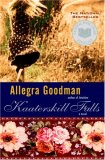Summary | Excerpt | Reading Guide | Reviews | Readalikes | Genres & Themes | Author Bio

The children are scrubbed pink and clean, dressed in their Shabbes clothes. They are playing Chinese checkers on the coffee table. In the kitchen Brocha stands on a chair and tries to wash the pots.
"That's enough soap," Elizabeth tells her.
"But the bubbles are all gone," Brocha protests.
"The soap is still there in the water. It's hiding."
"Hiding?" Brocha echoes dubiously. "Daddy! Daddy! Daddy! I'm washing the dishes."
"Yes, I see," says Isaac.
"Brocha, you aren't supposed to use soap," Malki calls out from the living room. "You aren't supposed to use soap on Shabbes."
"She's just playing," Elizabeth assures Malki. "And it's liquid soap." Isaac puts his arm around Elizabeth. He can hear through the wall their neighbors the Steins, already singing. In Kaaterskill the Steins have a place on Maple. The Buchsbaums upstairs will be singing too. They are old, and bought a big house in Kaaterskill early on, a huge place with a circular drive, and neat symmetrical flower beds and fir trees. The building is full of Kirshner families, and their Shabbes guests, hearing kiddush and drinking the wine. Somehow, their faint voices reassure Isaac. Of course, if Elizabeth opened her store in Kaaterskill it wouldn't be a store outside the community, it would be a business among neighbors, a service rendered among friends.
At the table Isaac and the girls stand next to their chairs and sing toElizabeth, as all the Kirshner families serenade the mother of the house on Friday night. "Ashes chayil miyimtza? V'rachok mipninim michrah. . . ." Who can find a virtuous wife? She is more precious than rubies. . . . She seeks out wool and flax, and works with eager hands. Isaac smiles as he sings the verses from Proverbs. He is thinking about the words. Is it really such a question whether a woman can start a business? This is the work of the virtuous wife, the "Ashes Chayil" in the ancient song: "She considers a field and buys it; / With her earnings she plants a vineyard." And "Ta'ama ki tov sachrah; / Lo yichbeh balaila nerah. She finds that her trade is profitable; / Her lamp is not snuffed at night." That could be Elizabeth, his wife, his businesswoman.
The children are standing at their places, the gold-rimmed plates in front of them. Chani and Malki tall and thin on one side of the table, Ruchel and Sorah on the other side, much shorter, their hair in their eyes, their faces still chubby, and Brocha is standing next to Elizabeth, only her head showing above the table, her Peter Rabbit plate in front of her. "She makes a garment and sells it, and delivers a belt to the merchant. . . . Let her have the fruits of her hands. . . ." The children are singing, although, of course, they aren't listening to the words; no one really listens. But tonight Isaac sees Elizabeth in that poem, the song everyone sings. He sees that the poem is not simply about the ideal wife, but about Elizabeth in particular. For Elizabeth is the woman who would plant a business, buy and sell, create something with her industry. She is the woman who deserves the fruit of her hands.
The song warms him. Magically, the words open up to him. He grasps them with recognition and relief. At the yeshiva, mastery of halachic arguments never came easily to Isaac, nor did quick recall of the narrative texts. But in his daily studies he still strives to understand, identify, take a text to heart, to reach through the centuries of commentary, those layers of responsa, and grasp a meaning that is strong, believable. And when it happens, and the words unfold for him and touch his life, this is a moment of great joy. The burden of decision falls away, and he is free, for he knows what he should do.
Isaac looks at Elizabeth at the foot of the table. She is clear eyed, smiling and half laughing at them as they sing to her. He is going to tell her that they should ask to see the Rav. After dinner he'll tell her. He will promise to go with her and help her. She will jump up to hear him say it. Even now, standing at the table, Isaac can see her, spinning on her heels. He can already feel it. He is dancing with her in his mind, spinning with her in delight.
Excerpted from Kaaterskill Falls by Allegra Goodman. Copyright © 1998 by Allegra Goodman. Excerpted by permission of The Dial Press, a division of the Bantam Doubleday Dell Publishing Group, Inc. All rights reserved. No part of this excerpt may be reproduced or reprinted without permission in writing from the publisher.
Your guide toexceptional books
BookBrowse seeks out and recommends the best in contemporary fiction and nonfiction—books that not only engage and entertain but also deepen our understanding of ourselves and the world around us.